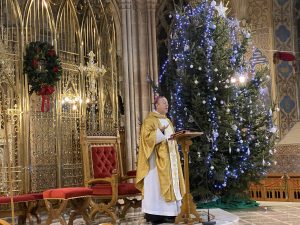 “Good people all, this Christmas time
“Good people all, this Christmas time
Consider well and bear in mind
What our good God for us has done
In sending his Beloved Son”.
Those inspiring words from the ‘Wexford Carol’, transcribed a century ago at Saint Aiden’s Cathedral in Enniscorthy, capture the true meaning of Christmas. If ever there was a year to cling to that comforting message, it is this year, 2020 – the year that a coronavirus shook the world and stopped it in its tracks. A few days ago some newspapers even ran with the headline: “Christmas is cancelled…” But it was only “fake news”. Thankfully the Good News brought by the angel to the shepherds on the first Christmas night rings out as true and as important as ever:
“Today a Saviour has been born to us; he is Christ the Lord”.
Christmas 2020 is certainly very different to Christmases past. For safety sake our congregation here inside the Cathedral is much smaller than usual; we’re ‘socially distanced’, masked and sanitised – even our carol singing is subdued. But thanks to the wonders of modern technology, you and your family members are joining us, along with hundreds – perhaps thousands – ‘live’ from your living room – your little “domestic church”, rejoicing with us in the miracle and mystery of ‘Emmanuel’ – God With Us!
Our thoughts and prayers tonight are with those who are unable to be home with us this Christmas, and especially with our ‘brothers and sisters’ who are struggling to cope this year with the pain of loneliness, suffering, grief and loss of employment. We are thankful that, even in the shadows and darkness of 2020, light has been shining out in countless examples of love and tenderness. Our communities have witnessed an outpouring of goodness, kindness, generosity and courage from neighbours, volunteers, doctors, nurses, chaplains and other carers; from teachers, shop-workers, clergy and so many others who have devoted themselves to keeping our essential services going.
We wish them all a well-deserved and happy Christmas, confident in the knowledge that their selfless efforts these past nine months are concrete expressions of the compassion, love and hope of Christ.
I find the message of the angel on the first Christmas night to be deeply consoling this year: “Do not be afraid”, the angel said to the terrified shepherds. “Listen, I bring you news of great joy, a joy to be shared with the whole people”.
How much we need to hear those words at this time: “Do not be afraid”. The pandemic has left us uncertain about the future, weary of all the ongoing restrictions, confused by changing messages, nervous – frightened even – about talk of new waves and new variants of the virus. It is only natural that we yearn for good news; we search for a glimmer of hope; we long for the promise of a brighter future.
People of faith find that good news, hope and promise in the wonder of the Christ-child, born in Bethlehem to be our Saviour. Like the Magi who followed the star, faith guides our journey through the uncertainty and the unknown. Just as a loving parent takes the hand of their frightened child, so we firmly grasp the hand of God who has made us, Who redeemed us and saved us, and Who is journeying with us every step of the way.
The hand of God and the hope that Christ brings is offered to each one of us, personally. Christmas invites us to a personal encounter and friendship with God. The angel’s message was direct and personal – not “I bring news of great joy”, but “I bring YOU news of great joy”.
Pope Benedict XVI put it powerfully when he wrote on this day 15 years ago: “Being Christian is not the result of an ethical choice or a lofty idea, but the encounter with an event, a person, which gives life a new horizon and a decisive direction (Deus Caritas Est 1)”. Today a Saviour has been born for US – for you and for me – personally. And this joyful message that ‘God loved us first’, is not something private or individual, or to be kept to ourselves. It is given, as the angel said, to be shared with others – shared ‘with the whole people”.
That is why it pains us so much when we are restricted from physically gathering to express our faith, when we are unable to be together as a full congregation, praying and praising and singing, “Glory to God in the Highest”! We hunger for Sunday worship and for the nourishment of the Eucharist. We long for this pandemic to be over so that we can safely meet together once more as the People of God, to “sing a new song to the Lord” and to offer each other the Peace of Christ – in person.
Looking forward to that day encourages us to make a special effort this Christmas and in the New Year ahead to keep Christ at the centre of our life – to welcome the Prince of Peace into our heart, home, family and community. We are commissioned by our Baptism to spread the Good News of the angel and to bring the Christmas message to life! We can do this by continuing Christ’s work of love, compassion, care, forgiveness, healing and charity – by keeping alive the light of hope that has already been shining brightly since the beginning of this awful pandemic in the witness of so many good people.
That light of hope is enkindled by reflecting in prayer for a few moments every day on the hope-filled message that is so succinctly captured in those words from the Wexford Carol:
“Good people all, this Christmas time
Consider well and bear in mind
What our good God for us has done
In sending his Beloved Son”.
Perhaps a “happy fault” of the Covid-19 restrictions has been the way that extra time and space has been opening up, away from the usual frantic rush and crazy consumerism – space for reflection and contemplation, and for assessing our lives. Many of us have been asking: ‘What is most important in life? How can I change? Who gives me hope? What carries me through when times are difficult? Where do I find light in the shadows and darkness?’
For Christians the answers to those questions are found right at the heart of the Christmas story – in the wonder of the Christ-child, born to be our Saviour; in the unfathomable mystery of Emmanuel, “God With Us”.
“Within a manger he was laid,
And by his side the virgin maid,
Attending on the Lord of life,
Who came on earth to end all strife”.
Happy Christmas
Prayer of Pope Benedict XVI
From Deus Caritas Est (God is Love)
Holy Mary, Mother of God,
you have given the world its true light, Jesus, your Son – the Son of God.
You abandoned yourself completely
to God’s call
and thus became a wellspring
of the goodness which flows forth from him.
Show us Jesus. Lead us to him.
Teach us to know and love him,
so that we too can become
capable of true love
and be fountains of living water
in the midst of a thirsting world.
Amen



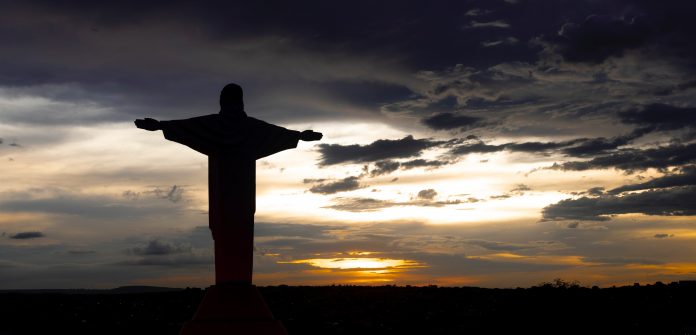


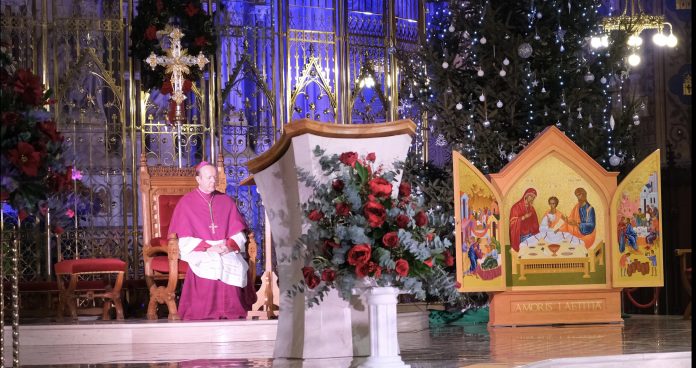
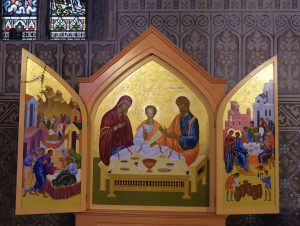
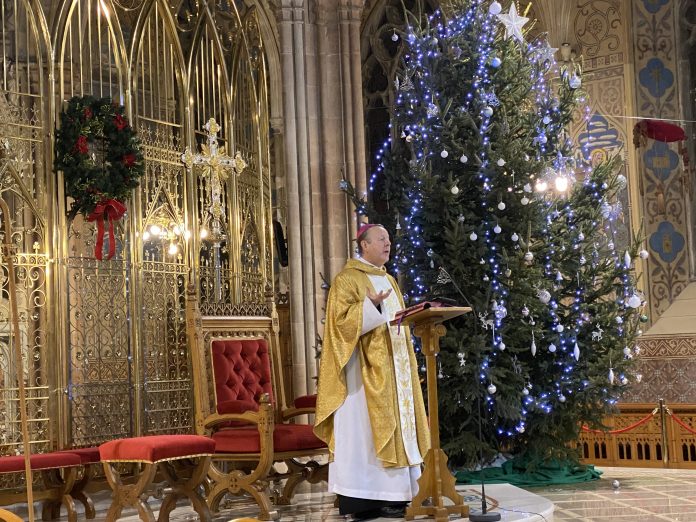


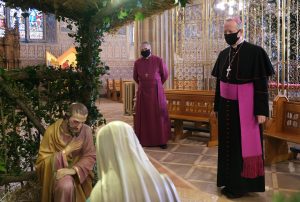
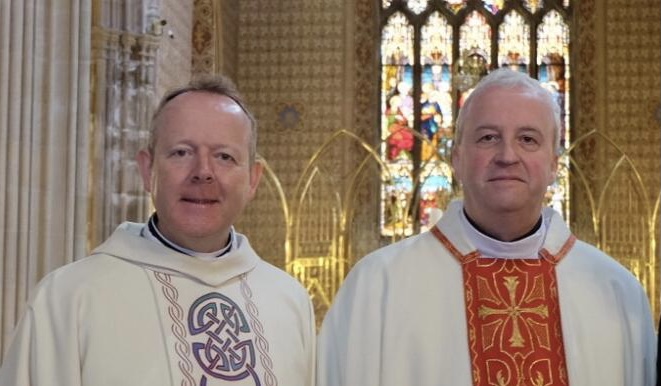




You must be logged in to post a comment.